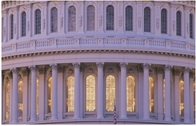Advertisement
House Introduces HR 861 to Terminate the Neighborhood Stabilization Program

The House of Representatives has approved legislation to end a bailout program for lenders and real estate speculators. The legislation, HR 861, the the NSP Termination Act, introduced by Rep. Gary Miller, ends the so-called Neighborhood Stabilization Program (NSP). This is the third bill approved by the House in the last two weeks that ends a failed program. Each of the three bills was first approved by the House Financial Services Committee.
“Today the House acted yet again to end wasteful spending on a government program that does nothing to help homeowners facing foreclosure," said Financial Services Committee Chairman Rep. Spencer Bachus of HR 861. "In fact, this program creates perverse incentives for banks and other lenders to foreclose on homeowners. This program is not only bad for struggling homeowners, it’s horrible for taxpayers, too. It uses taxpayer money to bail out lenders and real estate speculators. We simply cannot continue to use taxpayer dollars to bailout those who made bad decisions.”
The NSP provides taxpayer dollars to state and local governments, as well as non-profits, to purchase, rehabilitate, and resell foreclosed properties. Giving these entities taxpayer dollars to purchase foreclosed properties does nothing to help struggling homeowners stay in their homes. In fact, the program represents a costly bailout of lenders, servicers, and real estate speculators who made risky bets on the housing market and will now offload their foreclosed property onto the taxpayer.
“I am pleased that the House of Representatives voted today to terminate the ineffective and unaccountable Neighborhood Stabilization Program," said Subcommittee Chairman Rep. Gary Miller. "The NSP, which has already consumed $6 billion, does absolutely nothing to help homeowners facing foreclosure. Instead, it gives away billions of dollars while lacking the proper oversight and accountability protocols necessary to ensure that program funds are being used effectively and are allocated to the areas of greatest need. The program has been plagued with problems since its inception. The Inspector General for the Department of Housing and Urban Development (HUD) has identified multiple cases where NSP funds have been misused, while the Government Accountability Office has questioned whether the information systems in place at HUD are even capable of tracking the uses of this money. The American people are demanding that their government learn to live within its means. We cannot afford to continue to spend borrowed money on unworkable government programs such as the NSP. I encourage my colleagues in the United States Senate to quickly take up this important legislation.”
The NSP has been plagued with problems since its creation in 2008. The Inspector General of the Department of Housing and Urban Development has identified multiple misuses of NSP money at the state level. The Government Accountability Office has also questioned whether HUD has the capacity of properly tracking the use of funds provided under this program. The NSP has continued to receive more and more taxpayer funding even though it was supposed to be a temporary program. The NSP was provided $4 billion at its inception in 2008, $2 billion more in 2009, and another $1 billion as part of the Dodd-Frank Act in 2010.
About the author





